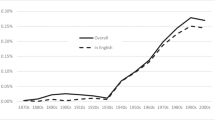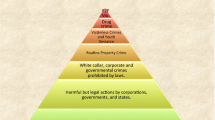Abstract
Slippery slope arguments (SSAs) have often been viewed as inherently weak arguments, to be classified together with traditional fallacies of reasoning and argumentation such as circular arguments and arguments from ignorance. Over the last two decades several philosophers have taken a kinder view, often providing historical examples of the kind of gradual change on which slippery slope arguments rely. Against this background, Enoch (2001, Oxford Journal of Legal Studies 21(4), 629–647) presented a novel argument against SSA use that itself invokes a slippery slope. Specifically, he argued that the very reasons that can make SSAs strong arguments mean that we should be poor at abiding by the distinction between good and bad SSAs, making SSAs inherently undesirable. We argue that Enoch’s meta-level SSA fails on both conceptual and empirical grounds.
Similar content being viewed by others
References
American Family Research Council: 2004, The Slippery Slope of Same-Sex Marriage
Corner, A., U. Hahn and M. Oaksford: 2006, ‹The Slippery Slope Argument: Probability, Utility and Category Boundary Reappraisal’, in Proceedings of the 28th Annual Conference of the Cognitive Science Society, Vancouver, pp. 1145–1151
Enoch D. (2001). Once You Start Using Slippery Slope Arguments, You’re on a Very Slippery Slope. Oxford Journal of Legal Studies 21(4):629–647
Govier T. (1982). What’s Wrong with Slippery Slope Arguments. Canadian Journal of Philosophy 12: 303–316
Hahn U., Oaksford M. (2006). A Bayesian Approach to Informal Fallacies. Synthese 152(2): 207–237
Hahn U., Oaksford, M. (2007). The Rationality of Informal Argumentation: A Bayesian Approach to Reasoning Fallacies. Psychological Review 114(3):704–732
Hahn, U., M. Oaksford and H. Bayindir: 2005a, ‹How Convinced Should We be by Negative Evidence?’, in Proceedings of the 27th Annual Meeting of the Cognitive Science Society, Stresa
Hahn, U., M. Oaksford and A. Corner: 2005b, ‹Circular Arguments, Begging the Question and the Formalization of Argument Strength’, in Proceedings of AMKCL05—Adaptive Knowledge Representation and Reasoning, Helsinki
Hamblin, C. L. (1970) Fallacies. Methuen: London
Holtug N. (1993). Human Gene Therapy: Down the Slippery Slope. Bioethics 7: 402–419
Lamb D. (1988). Down the Slippery Slope—Arguing in Applied Ethics. Croom Helm: London
Lode E. (1999). Slippery Slope Arguments and legal Reasoning. California Law Review 87: 1468–1543
Oaksford M., Hahn U. (2004). A Bayesian approach to the argument from ignorance. Canadian Journal of Experimental Psychology, 58: 75–85
Petty R.E., Cacioppo J.T., Goldman R. (1981). Personal Involvement as a Determinant of Argument-Based Persuasion. Journal of personality and Social Psychology 41(5): 847–855
Petty R.E., Cacioppo J.T., Goldman R. (1984). The Effects of Involvement on responses to Argument Quantity and Quality: Central and Peripheral Routes to Persuasion’. Journal of Personality and Social Psychology 46(1) 69–81
Pratt J., Raiffa H., Schlaifer R. (1995). Introduction to Statistical Decision Theory. Massachusetts: MIT Press
Volokh E. (2003). The Mechanisms of The Slippery Slope. Harvard Law Review 116: 1026–1137
Walton D. (1992). Slippery Slope Arguments. Clarendon Press: Oxford
Whately R. (1836). Elements of Logic. New York: William Jackson
Author information
Authors and Affiliations
Corresponding author
Rights and permissions
About this article
Cite this article
Corner, A., Hahn, U. Evaluating the Meta-Slope: Is there a Slippery Slope Argument against Slippery Slope Arguments?. Argumentation 21, 349–359 (2007). https://doi.org/10.1007/s10503-007-9047-x
Received:
Accepted:
Published:
Issue Date:
DOI: https://doi.org/10.1007/s10503-007-9047-x




